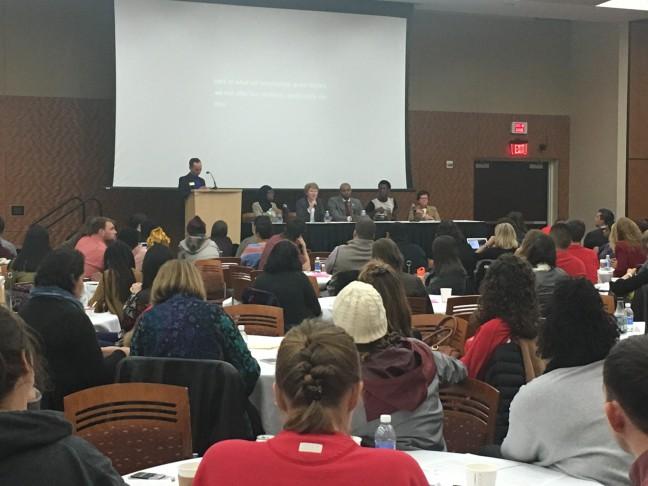The Division of Diversity, Equity, and Educational Achievement hosted the author of “White Fragility” at the University of Madison first day of its 2020 Diversity Forum Tuesday.
Robin DiAngelo gave a speech on systemic racism, highlighting how white people struggle to see and acknowledge it. DiAngelo began her speech by addressing white people’s privilege in America.
“[White people’s bias] is backed with legal authority and institutional control that transforms it into a far-reaching system, which is infused across the fabric of the entire society,” DiAngelo said.
One needs to focus on systemic racism by studying how to combat it and asking reflective questions of themselves, DiAngelo said. If not, white people’s opinions about racism will be uniformed and superficial.
According to DiAngelo, the deep, embedded system of racism in America will not be uprooted by being a bystander. Anti-racist action needs to be taken to dismantle the system and undo the effects of discrimination from the last hundreds of years, DiAngelo said.
“This system is not interrupted by friendly news and smiling and being a nice person and having a buddy you go to the gym with, and so on,” DiAngelo said. “It’s not interrupted by good intentions. Only a strategic anti-racist action can interrupt this system.”
Additionally, it is crucial white people begin to completely rewire their view of a “racist,” because every single white person has taken part in and benefited from systemic racism, DiAngelo said.
DiAngelo said many people deem racists to be those who are out to hurt others based on their race, allowing people to discount themselves.
“I’m very clear I perpetrated racism in my life, and I am also very clear not one moment of it was conscious or intentional, but I harmed others, nonetheless,” DiAngelo said. “So, what this definition does is allow us to dismiss ourselves.”
In the latter part of her speech, DiAngelo focused on white fragility — the tendency for white people to defend themselves when deemed racist and to try to disprove their participation in systemic racism.
She indicated most white people get to the end of their lives having had few, if any, authentic sustained cross-racial relationships. In fact, many measure the absence of Black people as what gives status to their environment, DiAngelo said.
DiAngelo offered a few reflection questions for white people to understand their racial biases.
“Was your neighborhood where you grew up diverse?” DiAngelo asked. “If not, why? Where did people of other races live? What was it like where they lived? Did you parents have a significant number of Black friends? Are your professors overwhelmingly white?”
She ended her speech by encouraging white people to challenge their own racial biases — especially if they think they are not present — as well as those of their family members and friends.


